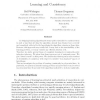Free Online Productivity Tools
i2Speak
i2Symbol
i2OCR
iTex2Img
iWeb2Print
iWeb2Shot
i2Type
iPdf2Split
iPdf2Merge
i2Bopomofo
i2Arabic
i2Style
i2Image
i2PDF
iLatex2Rtf
Sci2ools
118
click to vote
GOSLER
1995
1995
Learning and Consistency
In designing learning algorithms it seems quite reasonable to construct them in such a way that all data the algorithm already has obtained are correctly and completely reflected in the hypothesis the algorithm outputs on these data. However, this approach may totally fail. It may lead to the unsolvability of the learning problem, or it may exclude any efficient solution of it. Therefore we study several types of consistent learning in recursion-theoretic inductive inference. We show that these types are not of universal power. We give “lower bounds” on this power. We characterize these types by some versions of decidability of consistency with respect to suitable “non-standard” spaces of hypotheses. Then we investigate the problem of learning consistently in polynomial time. In particular, we present a natural learning problem and prove that it can be solved in polynomial time if and only if the algorithm is allowed to work inconsistently.
Related Content
| Added | 26 Aug 2010 |
| Updated | 26 Aug 2010 |
| Type | Conference |
| Year | 1995 |
| Where | GOSLER |
| Authors | Rolf Wiehagen, Thomas Zeugmann |
Comments (0)

